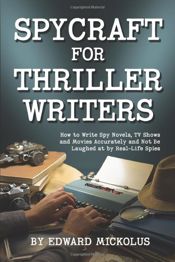Spycraft for Thriller Writers: How to Write Spy Novels, TV Shows and Movies Accurately and Not Be Laughed at by Real-Life Spies

This is a book that describes the U.S. intelligence community so that spy novel writers can describe it more accurately. Note the subtitle:
How to Write Spy Novels, TV Shows and Movies Accurately and Not Be Laughed at by Real-Life Spies
The book delivers on what it says – it’s a very stark dissection of how the different agencies of the intelligence community operate together. It also digs into some of the physical aspects of the CIA, like where the parking is, where the entrances are, what you would see if you walked through headquarters, etc.
The author spent 33 years at The Agency (that’s what you’re supposed to call it, according to the book). He clearly has a lot of inside knowledge, and he goes out of his way to explain how to write a realistic spy novel. The life of a CIA analyst is a pretty boring one, it turns out.
And this is where I got to wondering – when we read a spy novel, do we really want realism? Every time I try to read John Le Carre, I regret it. (I specifically noted this in my review of A Legacy of Spies…)
Let’s go back to the last half of the subtitle:
How to…Not Be Laughed at by Real-Life Spies
But do we write spy novels and make spy movies for real-life spies? No. They already lived it – why would they be watching anyway? Even if they were watching, do we care if they laugh? Are they the target audience to be entertained?
I belong to a community on Facebook about spy fiction. There’s often discussion on “realism vs. popcorn.” Do we want realism, or do we want something to watch while snacking on popcorn in the theater?
I think there’s a balance, and if we followed all the directions in this book, we’d swing way, way over to realism. The best stories are somewhere in the middle. Just realistic enough they might actually happen, but wild enough that they’re way more fun that an analyst reading and attending meetings all day.
That said, it’s a fun book. I like to know how intelligence agencies work, and clearly there’s lots of that in here. I’d wager that very few people who read this will actually write a spy novel. They’ll probably be like me – spy fiction fans who want to learn more about how the CIA functions.
In that sense, mission accomplished.
Book Info
- I have read this book. According to my records, I completed it on .
- A softcover copy of this book is currently in my home library.